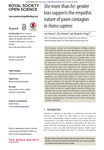She more than he: gender bias supports the empathic nature of yawn contagion in Homo sapiens
| dc.contributor.author | Norscia, Ivan | en_US |
| dc.contributor.author | Demuru, Elisa | en_US |
| dc.contributor.author | Palagi, Elisabetta | en_US |
| dc.date.accessioned | 2016-07-04T03:48:53Z | |
| dc.date.available | 2016-07-04T03:48:53Z | |
| dc.date.issued | 2016 | en_US |
| dc.identifier.other | HPU4160321 | en_US |
| dc.identifier.uri | https://lib.hpu.edu.vn/handle/123456789/21832 | |
| dc.description.abstract | Psychological clinical and neurobiological findings endorse that empathic abilities are more developed in women than in men. Because there is growing evidence that yawn contagion is an empathy-based phenomenon, we expect that the female bias in the empathic abilities reflects on a gender skew in the responsiveness to others’ yawns. We verified this assumption by applying a linear model on a dataset gathered during a 5 year period of naturalistic observations on humans. Gender, age and social bond were included in the analysis as fixed factors. | en_US |
| dc.format.extent | 9 p. | en_US |
| dc.format.mimetype | application/pdf | |
| dc.language.iso | en | en_US |
| dc.subject | Psychology and cognitive neuroscience | en_US |
| dc.subject | Behaviour | en_US |
| dc.subject | Cognition | en_US |
| dc.subject | Psychology | en_US |
| dc.subject | Yawn contagion | en_US |
| dc.subject | Humans | en_US |
| dc.subject | Empathy | en_US |
| dc.subject | Female bias | en_US |
| dc.subject | Social bonding | en_US |
| dc.title | She more than he: gender bias supports the empathic nature of yawn contagion in Homo sapiens | en_US |
| dc.type | Article | en_US |
| dc.size | 452KB | en_US |
| dc.department | Education | en_US |
Files in this item
This item appears in the following Collection(s)
-
Education [806]

